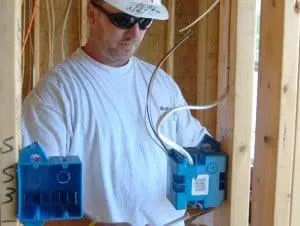 ElectricalConnection.org
ElectricalConnection.org
Connect with Us:
Facebook
LinkedIn
Twitter
YouTube
 A serious house fire in Ballwin, Mo. has raise questions about the safety of aluminum wiring in homes and businesses. Fox 2 reported on the fire on February 15, 2016. According to Fox 2, fire investigators believe it was caused by an aluminum wiring connection in the home.
A serious house fire in Ballwin, Mo. has raise questions about the safety of aluminum wiring in homes and businesses. Fox 2 reported on the fire on February 15, 2016. According to Fox 2, fire investigators believe it was caused by an aluminum wiring connection in the home.
Aluminum wiring became popular in homebuilding in the 1960s and 1970s as a cheaper alternative to traditional copper wiring, a staple of homes since the late 19th century. While it is permitted under the National Electrical Code, before considering aluminum wiring, homeowners should check with their local governments to ensure aluminum wiring is permitted under local codes.
Aluminum wiring is not a maintenance-free wiring. Terminations need to be inspected and tightened on a regular basis by a professional. Homeowners need to be aware of the following:
Copper is a better conductor of electricity than aluminum. It takes a larger gauge of aluminum wiring to safely conduct electricity as copper wiring. For example, a wiring plan calling for 14 gauge copper wiring would need 12 gauge aluminum wiring (the lower gauge, the larger the wire). In addition, home owners need to be aware that home improvement stores generally sell fixtures, switches and receptacles rated only for copper wiring. They should not be used for aluminum wiring.
The Electrical Connection-IBEW/NECA recommends that homeowners call a professional to evaluate the wiring in their home if they suspect it is comprised of aluminum. Solutions to making the home safer range from rewiring the home to tightening terminations to replacing fixtures, switches and receptacles to ensure they are rated for aluminum wiring. The Electrical Connection has the largest data base of licensed electrical contractors in St. Louis to give you peace of mind by ensuring your home is safely wired.
Recent News